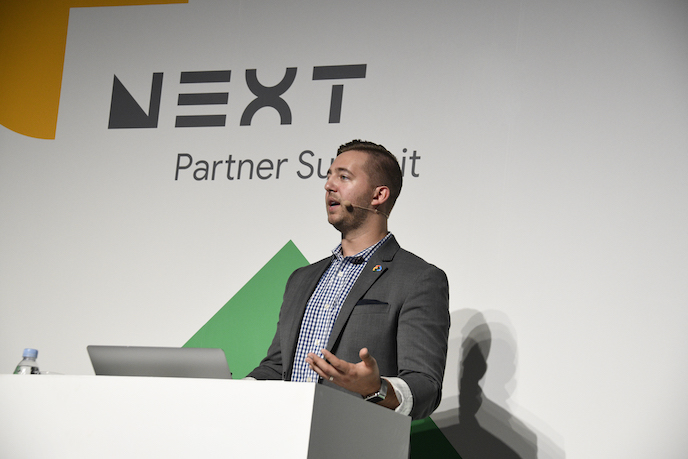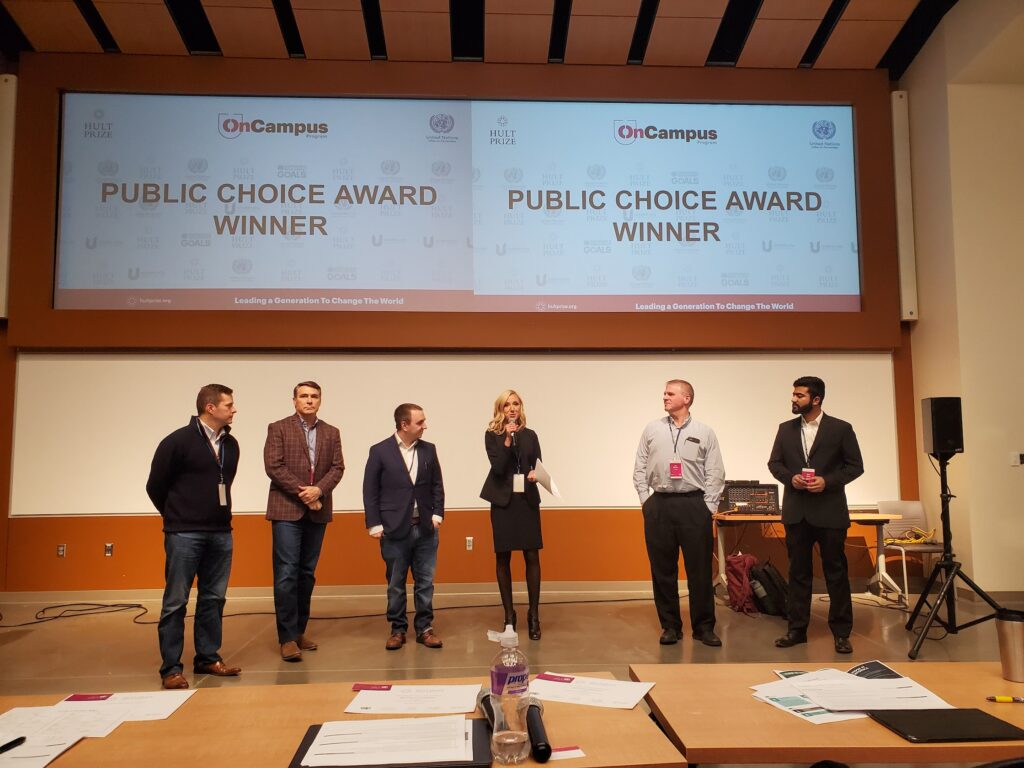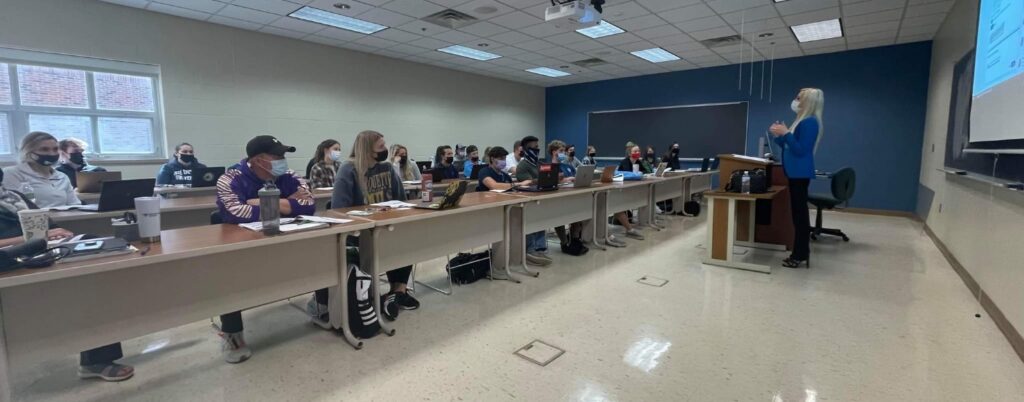SmartAsset released their list of the most resilient cities in the U.S. They analyzed 300 places including cities, towns, and census-designated places comparing 14 different metrics across four categories including employment, housing, social assistance/healthcare and economic stability. Sioux Falls was among the top 25 cities in the 2022 ranking.
Author: leahb
2022 Spirit of Sioux Falls Honoree: Mark Shlanta
The Sioux Falls Development Foundation posthumously honored Mark Shlanta, longtime CEO of SDN Communications, with its ‘Spirit of Sioux Falls’ Award at their 2022 Annual Meeting on Thursday, November 17.
The award is presented to an individual who has demonstrated leadership and commitment to the economic growth and development of Sioux Falls. The award honors the memory of former Development Foundation staff and board members David Birkeland, Angus Anson, and Roger Hainje, who perished along with Governor George Mickelson and other state officials and staff in 1993 as they returned from an economic development mission.
“Mark gave selflessly of himself to the greater cause of improving our community,” Foundation Board Chairman Kurt Loudenback said. “His commitment to economic development has helped to make Sioux Falls a model for public and private partnership in the spirit of the greater good. He was an example for others to put the community ahead of a personal agenda.”
In addition to his work at SDN, Shlanta chaired the Development Foundation board from 2008-2009 and was chair of the Forward Sioux Falls Joint Venture Management Committee from 2011-2016. He also co-chaired two capital campaigns for Forward Sioux Falls and one for the Boy Scouts. He was active in many other areas of the community, including serving on the board of directors for both South Dakota Public Broadcasting and Bishop O’Gorman Catholic Schools.
Spirit of Sioux Falls Award 2022: Mark Shlanta
Virginia couple finds career growth, better lifestyle with move to Sioux Falls
Nick Kolb and Sidney Stone agreed: It was time to leave Virginia.
“The cost of living, congestion, traffic, it’s all outrageous,” said Kolb, 29, who was working as an assistant to a dispatcher at UPS balancing delivery routes at the time.
“The weather’s gross too,” added Stone, 27, who began her career as a patient access technician in a hospital and then became a supervisor at UPS. “I cannot put enough emphasis on how terrible it is to step out at 6 a.m. and not breathe because the air is so thick with humidity.”
While they both worked at UPS, they didn’t meet there. That happened thanks to some matchmaking on the part of Stone’s mother, who met Kolb through the fitness center where she worked.
“We both thought something needed to change,” Kolb said. “We hadn’t taken a trip together, and we like to be outdoors kayaking and hiking, so we wanted to go somewhere outdoorsy but not a hot attraction, so I said you’ve got the Black Hills and Mount Rushmore.”

He was familiar with this part of the country because his dad grew up in Minnesota. And even though the couple was traveling to western South Dakota, the best option was to fly into Sioux Falls and rent a car.
“So I started getting all these ads about Sioux Falls,” Kolb said.
He began reading about the city, its rankings for quality of life and career opportunities, “and I started throwing hints about South Dakota,” he said. “The cost of living is way cheaper. I figured she probably wouldn’t consider it, but since we were going out there anyway, I thought we should see what it has to offer.”
Stone was on board.
“So we decided to take one day of our vacation and drive around Sioux Falls and get a feel for the town and go downtown,” he said. “I had reservations about her liking it, but she really enjoyed it.”
Stone especially liked downtown Sioux Falls.
“And I was very skeptical at first from living on the East Coast,” she said. “But it just felt like home immediately. I can’t really put my finger on it, but there was so much to do and so much that interested us.”
While they headed to the Black Hills for their vacation, Kolb did some online searching and decided to send his resume in for an opening at Howe Inc.
“Within a week, they’d reached out and said they liked my resume and they knew I was in Virginia but would I ever come to Sioux Falls?” he said. “And I said it’s funny you’d ask that because I’m in South Dakota right now.”

They woke up at 3 a.m. and drove east across the state so he could make the job interview.
“And I woke up the following day with a job offer,” Kolb said. “I looked at Sidney said, ‘We can’t turn this down.’ And she said, ‘Let’s do it.’ So I accepted the offer, and a month later we moved out here in August of 2021.”
He’s now a commercial HVAC installer for Howe, which has helped him with on-the-job training and saw how his process skills from UPS translated to his new role.
“I love it,” he said. “The big change for me was I was used to a very repetitive workday, and now in commercial HVAC, every day is something different, and I look forward to it. I’m going into different businesses all around town and even out of state.”
Stone immediately began finding jobs too, first working in inside sales and then in human resources. She’s now a senior HR manager at Fleet Farm.

“I love Fleet Farm,” she said. “They gave me a really big opportunity, and they haven’t made me feel like it’s too much on my plate. I have my director’s ear whenever I need it, and when I have important questions, she’s always there for me. Having your boss actually be there, even if it’s virtual, to talk you through things is something I value so much. I love what I do and love the people I work with.”
The couple’s experience is a great example of the career opportunities and lifestyle early-career professionals find in Sioux Falls, said Denise Guzzetta, vice president of talent and workforce development for the Sioux Falls Development Foundation.
“This couple came to Sioux Falls with skills and early work experience, and Sioux Falls has delivered fantastic professional growth and mentoring,” she said. “They’re both going to be able to build their careers and professional networks here for years to come.”
Outside of work, “we’re big foodies, and we’ve discovered Sioux Falls has a great food scene,” Stone said. “And we’ve done The District, which was cool and reminded us of one of the venues in Washington, D.C.”
They’ve also done downtown First Fridays, concerts at Levitt at the Falls and explored Palisades State Park and Valley of the Giants hiking trail at Big Sioux Recreation Area in Brandon.

“We’ve already gotten a group of friends,” Stone said. “You don’t create friend groups that quickly on the East Coast. It’s just not a cultural norm.”
The same has been true professionally, she added.
“There’s such a great HR community here. In Virginia, the groups felt very exclusive, and here I’ve already joined two HR groups, and I didn’t think I would be able to get a foothold that quickly,” she said. “It’s only been a year, and it’s been a whirlwind. It’s amazing we were able to get this chance just by moving here.”
Ready to learn more about carving your own path in Sioux Falls? Visit siouxfalls.com, or reach out to deniseg@siouxfalls.com.
Talent Thursday with Anna Moe
Talent Thursday is a weekly social media livestream event that spotlights talent and workforce in the Sioux Falls area by sharing the stories of young professionals in our community.
For Thursday, October 13, 2022, we caught up with Anna Moe of New York Life. She shares about her journey from Owatonna, MN, to Sioux Falls, and what she loves about living and working here.
Talent Thursday is held weekly on Thursdays at 3 p.m. CT on the Sioux Falls Development Foundation’s Facebook page. Follow here: https://www.facebook.com/developsf.
Talent Thursday
POWERED BY:

Forward Sioux Falls is a unique, innovative program designed to grow and improve the Sioux Falls region. Created through a joint venture between the Greater Sioux Falls Chamber of Commerce and the Sioux Falls Development Foundation, we work to outline strategic initiatives to grow jobs, businesses and quality of life.
From Alaska to Sioux Falls, move allows childhood friends to reunite in business ownership
Kyle Brown and his childhood friend Matt Ristau were in an RV in Alaska when a business was born.
It was 2020, Ristau had wanted to visit his friend stationed in Alaska to go fishing, “and I said this is the year to do it,” Brown said. “No one is traveling, and you won’t catch COVID in the middle of the ocean.”
The two go back to their days at Roosevelt High School, where they graduated together in 2000, and then went to SDSU together before Ristau transferred to USD and Brown joined the Air Force.

“The first year in college, Matt and I decided someday we’d own a business together,” Brown said. “We didn’t know what that was going to be.”
Brown went on to live across the country, from California, to Texas twice, Maryland and finally Alaska, where he spent 13 years.
It was while reconnecting in Alaska that Ristau’s background in commercial cleaning led them to their business concept.
“We started talking about how we do commercial cleaning and the service industry in general the right way,” Brown said. “Taking care of employees and providing professional cleaning services.”

They knew Brown’s military career would allow him to move back in two years, so they set a 2022 launch date – and met it.
RightWay Commercial Cleaning now offers carpet and office cleaning for businesses, events and public facilities.

“I think the market forces we talked about back in 2020 have only gotten stronger, as far as the importance of having a good, dedicated, professional staff and treating them right,” Ristau said. “We’ve been busy, and we’re looking to get busier, and now that Kyle’s back in town, we’re working on building it all up.”
Brown and his wife, Bethany, moved back with their kids this year.

“My wife is from California and Colorado, so I was worried about convincing her South Dakota was the place to go for our forever home, but she loves it,” Brown said. “I was worried I was painting a super-rosy picture from what I remembered, but as soon as we bought our house and moved back this summer, we had people we didn’t even know coming over working on the house and helping mow the lawn and replace sprinklers. Only in South Dakota is that a thing for people you didn’t even know to come help.”
She’s now going back to school to earn a master’s degree, with their kids in high school, middle school and elementary school.
“Our kids are loving it here,” Brown said. “The schools are amazing. Even in a couple weeks, they’ve been happy and adjusting, and we’re not even done unpacking yet.”

After years of tight military housing, the family is loving its yard, a bonus swimming pool and new puppy.
“They just enjoy having space and everyone being able to spread out and have fun,” Brown said.
“When you live in Alaska, it’s hard to get other places unless you fly, and now we’re in the middle of the country, and we can do Yellowstone, the Black Hills and drive to Denver.”
The family represents a trifecta of reasons why people are moving to and loving Sioux Falls, said Denise Guzzetta, vice president of talent and workforce development for the Sioux Falls Development Foundation.
“Their experience checks so many boxes, from returning to your roots, to growing a business, continuing your education and supporting your family,” she said. “We’re thrilled to see them succeeding already in every way.”
Brown agreed that after a whirlwind of moves, it has been an ideal place to settle.
“Everywhere I’ve lived has something good about it,” he added. “Texas had great food, California was beautiful, Alaska has great hunting and fishing, but the one thing I compared everywhere to and that I missed was the people and sense of community. Nowhere compares to South Dakota when it comes to that.”
To learn more about RightWay Commercial Cleaning, visit rightwaysd.com.
Ready to learn more about carving your own path in Sioux Falls? Visit siouxfalls.com, or reach out to deniseg@siouxfalls.com.
‘Culture, Culture, Culture: If you don’t get it right, nothing else matters’ among panels at workforce development event
By the end of 2022, Showplace Cabinetry will have shipped more cabinets in a year than ever — more than 200,000.
“And we have a backlog that will carry us through year-end,” CEO Bill Allen said of production. “We will feel very fortunate to be blessed with a record sales revenue year as well. We now have 720 employee-owners — another record — at Showplace, who work their tails off every day to meet our customers’ demands.”
None of that happens without a strong company culture.
On Oct. 26, Allen will speak on a panel addressing workplace culture at the fifth annual WIN in Workforce Summit, which runs from 9 a.m. to 3:30 p.m. at the Sioux Falls Convention Center.
The topic is “Culture, Culture, Culture: If you don’t get it right, nothing else matters.” And Allen will be joined by Carrie Anderson of Avera, Tara Cox of Wilbur-Ellis and Teri Schmidt of Experience Sioux Falls for a discussion moderated by New York Life’s Anna Moe.
We caught up with Allen for a preview.
You’re speaking on the topic of culture, which is broad and in some cases open to interpretation. How would you describe how you and Showplace view culture? What does that mean to you?
It may be cliche, but the words “family, caring and good people” get used often by employees explaining how they feel about working at Showplace. When we are making decisions that involve employees, we go by the philosophy of treating people how you would like to be treated yourself. Every decision we make, we look at how it will affect our employees whether good or bad. When you respect people, are fair, honest and upfront with them, put yourself in their shoes, then the right decisions are easier to make. Our employees are a big part of our culture; they are always looking out for each other. Employees step up to help someone who is fighting breast cancer, has had a house fire or something as simple as needing a ride to work. It will always be our people that define us. We continually hear “That is why I work at Showplace: It is the people.”
Culture also can be hard to define, but from your perspective, how would you describe the culture at Showplace?
Culture is a reflection of the way you run the company; it is something that is woven into what you do every day. We have become more self-aware in recent years that culture can feel different to those in the office, in leadership positions, versus those who work on the production floor. That self-awareness drives us to want to ask questions, listen and learn more about how our employees think and feel about things at work. We are a manufacturer. The fact is some days things don’t go well. It’s hard work, we have issues just like everyone does, we can always improve. One thing is for sure, we try to make the work environment we have here the best we possibly can for our employees given the industry we are a part of.
What have you done intentionally to try to cultivate that culture?
Over the years, we have expanded benefits and employee programs, started company traditions and improved our facilities – all of this has become part of our culture. I have a tendency to want to list all those things as important aspects of our culture. Robust employee benefits, “perks” if you will, are necessary and useful to get people through the door, but they don’t always motivate people to stay with a company and do the best job they can. In addition to having nice “perks,” we are spending a great deal of time and effort trying to develop better leaders, foster creativity at all levels and encourage employee involvement.
I think our leadership team is very approachable, and it starts with me. I feel anyone at Showplace should be able to come up and talk to me about anything work-related. If I can’t answer their question, I’ll find someone who can. The goal is developing a mindset for all employees that they are not just a number here – they are an important part of our operation. One of our senior managers brought up to me that Showplace is really like a second family for a lot of our employees. It is a job, but it is more than that. It is stability in people’s lives, a place where they can contribute daily to something meaningful. When we work together, do our jobs well, we have the ability to produce something people want to buy and grow our company. That success in our work lives can spill over into individual’s personal lives.
Culture also always is evolving. Are there some elements of yours that you’re focused on improving, and how are you doing that?
This is something we talk about often. What was important to employees 10 or 15 years ago may or may not be important to employees today or in the next 10 to 15 years. If you are not consciously looking at how to evolve your culture in the workplace, it will come back to bite you in the long run.
We’ve put a focus on improving English language skills, and we actually teach English classes in-house now. We’ve strengthened our new-hire training programs, and we’ve really looked into and tried to simplify our application process, looking at how people conduct job searches today. What are potential employees looking for, how do we match up and making sure we are hitting the sweet spots the best we can. It is a constant process. Our goal is to be an employer of choice in the region. We focus on being forward-thinking, innovative and competitive with the benefits we offer.
What advice would you give to other businesses looking to address or improve their culture?
Every business has a culture whether you want one or not; usually it is a reflection of how you treat your employees. Pay is one thing, but honestly listening to employees and showing them respect, fairness and appreciation will go a long way towards building a better culture. When you have a decision to make regarding employees, ask yourself how you would want to be treated in that situation and then make the decision. We certainly know that our culture isn’t for everyone, and every employee isn’t for us. But we hope the culture we do have attracts the people who are a good fit!
What broader benefit have you found as a business to your intentional focus on culture?
Happier employees! I don’t want to mislead anyone – it is very difficult to find and retain employees in the Sioux Falls metro area. I just read there are over 30,000 open jobs in South Dakota and something like 10,000 people actually looking for jobs. That is a big problem, and Showplace is not immune to the difficulties associated with that. The way we look at it is: How hard would it be to find and keep employees if we weren’t doing any of these things?
Register today
The Sioux Falls Development Foundation is an approved recertification provider for the Society for Human Resource Management, and human resources professionals who attend WIN can earn nine professional development credits.
Tickets are $89 for in-person attendance, which includes lunch and snacks, and $20 for virtual attendance. Group discounts are available. Contact deniseg@siouxfalls.com.
Talent Thursday with Kate Solberg
Talent Thursday is a weekly social media livestream event that spotlights talent and workforce in the Sioux Falls area by sharing the stories of young professionals in our community.
For Thursday, September 23, 2022, we caught up with Kate Solberg a sales manager with Experience Sioux Falls (formerly the Convention and Visitors Bureau). She shares about her college experience and what led up to her position with Experience Sioux Falls.
Talent Thursday is held weekly on Thursdays at 3 p.m. CT on the Sioux Falls Development Foundation’s Facebook page. Follow here: https://www.facebook.com/developsf.
Talent Thursday
POWERED BY:

Forward Sioux Falls is a unique, innovative program designed to grow and improve the Sioux Falls region. Created through a joint venture between the Greater Sioux Falls Chamber of Commerce and the Sioux Falls Development Foundation, we work to outline strategic initiatives to grow jobs, businesses and quality of life.
‘Neurological Nomad’ brings insight from leading change at Google to WIN in Workforce Summit
Travis Hahler lives in a world of constant change.
The Webster native and USD graduate – class of 2010 and 2012 – leads global change and transformation for Google, while based in South Dakota.
But Hahler is an entrepreneur, too, who is building his organization, The Neurological Nomad, into a powerhouse resource for businesses looking to drive change with people at the forefront.
In just a decade, Hahler has built an impressive resume working with more than 100 companies around the world, including 40 percent of the Fortune 100 list.
On Oct. 26, he will be a keynote speaker at the fifth annual WIN in Workforce Summit, which runs from 9 a.m. to 3:30 p.m. at the Sioux Falls Convention Center.
We caught up with Hahler for a preview.
First, congratulations on your success. What is it about your work that you think has helped you distinguish yourself so early in your career?
Thank you so much. I’m proud of the work I’ve done so far, but I am far from finished.
In terms of distinguishing myself, I think the biggest differentiator has been my perspective and unique point of view. I see a lot of really smart people with singular backgrounds like MBAs, psychology, neuroscience, but having all three creates a fuller view of things that others without that exposure wouldn’t be able to see. That perspective has allowed me to anticipate the needs of employees and leaders, empathize with their experiences, draw incredibly accurate conclusions about their actions and motivations, and be able to articulate all of that to leaders in a language they understand. The piece of all of this that has distinguished me the most is then being able to take that perspective and build tactical plans that seemingly anticipate employee reaction and employee needs while also taking into account the larger environment that the employee is living in at that moment.
What will the theme of your keynote be at the WIN in Workforce Summit?
The theme of the keynote goes hand in hand with the mission of The Neurological Nomad, which is to help today’s leaders leverage neuroscience, neuropsychology and human behavior to design employee-centric organizations and drive transformational change. So what that is going to look like for the WIN in Workforce Summit is first a discussion about neuroscience and the impact that our human physiology has on our behavior, and then we are going to talk about how we leverage that information in business and at our organizations. It’s my goal to help the audience see that neuroscience and behavioral psychology is the bridging point between successfully meeting their business goals and objectives, their workforce goals and objectives, and the desires and goals of their employees.
If I’m a CEO, do I really need to know much about neuroscience?
I think all incredible leaders need to understand people, and there are really two ways that incredible leaders can get to that level of understanding. The typical way a leader learns to understand people is through experience working with them. This is very surface level and built through years of experiences and trial and error. After that, you can probably guess what your organization’s reaction to something will be based on previous reactions over similar situations you’ve seen, or you’ll be able to categorize people’s motivations and ways of working based on other people that you know who are similar or exhibit similar styles. You understand what happens, but you don’t understand why. You can still be a great leader with this type of understanding.
I’m sorry to all the leaders that became great through this method because neuroscience is a shortcut and a multiplier all at the same time. Neuroscience explains the “why” behind people’s behavior. So if you understand neuroscience, you understand people. You’ll be able to do all of the same things I just mentioned in a fraction of the time. What’s even better is that you don’t even need to know someone in order to understand how they will likely react if you understand neuroscience. Understanding neuroscience is a fast track to becoming an incredible leader and understanding people.
Are there some basics that can help me shift my thinking and see an impact with my workforce?
Absolutely, and that is why I do what I do. Neuroscientists don’t publish research that is simple to understand, so I view my job as an interpreter between science and business with regard to neuroscience and behavioral psychology and make it simple. The benefit that you get when learning theory about neuroscience is that it can be both theoretical and experiential at the same time because neuroscience dictates how you react as well as how others react. So, as you learn, you can also reflect on personal experiences and see how neuroscience or neurology influenced that reaction and the reasons you reacted as predicted or the reasons you didn’t.
What can neuroscience tell us about what motivates people? Does that directly tie to workforce attraction and retention?
There is a lot out there about motivation and the brain, but I think it’s deeper than that. What neuroscience tells us about humans is that from our humble beginnings, we have sought safety and security. First, it was from the wild, and now it is what most people would call “stability.” Our brain is wired for that. When we think about attraction and retention for employees, the quickest way to get a bad reputation and for your employees to start leaving is by creating an unstable environment in the workplace and triggering your employees to seek stability.
I don’t want to give too much away because we will explore what those trigger points are and ways to overcome them during the keynote, but here is what I will say: This is going to be exceptionally important as our world continues to change at a greater velocity than ever before. Stability will need to shift from the idea that “I’ve been here for many years, and I know it is the same day to day, and that provides me stability” to “I know my leaders and the way that they have taken my well-being and needs into consideration every time we change or transform and that provides me with stability.” It’s incredibly different from what we have traditionally seen for our workforce, and I believe neuroscience is the key to helping our leaders where they need to be for this shift to happen.
What are some of the common or most compelling issues that you’re hearing from the businesses you work with through The Neurological Nomad? Are there any emerging issues?
As I’ve been talking with different organizations and leaders, there are certainly a few things that I am hearing across the board. The first, and this has been for a while, is the rate of change as companies race to embrace digital transformation and prepare their organizations for what is next and their future. Second, employee retention and attraction. Finally, social justice, diversity and employee wellness.
The common string among all of these is how we operate and understand our employees. I think there has been a long time where employers have been promising certain things and failing to execute on those promises, and the Great Resignation was simply the result of a loss of trust in their employer. We need to rebuild that trust and create organizations that put employees first, not just write it on our corporate values on the website. I’m sure this isn’t a shock to you, but neuroscience is a huge part of making that happen.
What’s the most common mistake or oversight you see companies make when it comes to trying to implement change?
I think the biggest oversight I see is that organizations don’t understand their people and their people’s skill sets. This often leads to the organization not realizing the benefits of the change because their people were not prepared to operate in the new environment. I see this with companies that are going through digital transformation journeys a lot.
Often, organizations also try to do too much too fast. This is usually the result of an organization that hasn’t been proactive about advancing or in industries that haven’t been disrupted in a while. The ROI is rarely realized because people are too overwhelmed with change and not given an opportunity to internalize the new ways of working.
There is also usually a major disconnect between what leadership thinks their organization’s culture is and what it actually is and the maturity of that culture. What happens here is that leaders will often leave out critical engagement opportunities during the change process because “that’s just part of our culture” when in reality it’s not or it’s not mature enough yet to lean on it.
The good news is that we are going to talk about all of this during the keynote, and neuroscience has a lot to say in these areas!
What’s the biggest takeaway you hope the Sioux Falls audience has from hearing your keynote?
We have a lot of incredible people here in South Dakota and many great companies that either exist or will exist. My hope is that this will help our business leaders transform their organizations to either become people-centric or improve their people-centricity. I believe this is essential to being able to future-proof our South Dakota organizations and continue to grow, compete nationally and attract more great businesses to our state.
Is there anything else you’d like to add?
I would add just two things.
First, you are not alone in this journey. Building and growing a people-centric business is tough and complex, but I believe in what neuroscience and psychology have to offer and the ways that it can transform organizations. You’re not going to leave a 60-minute session and have all the answers, and if you need a partner in your journey, reach out to me at The Neurological Nomad.
Second, I’m so honored to be given the opportunity to speak at a South Dakota-based conference. I have spoken at hundreds of conferences and events but never one in South Dakota, so I am really excited to be a part of the WIN in Workforce Summit, and I hope you’ll join me there.
Register today
The Sioux Falls Development Foundation is an approved recertification provider for the Society for Human Resource Management, and human resources professionals who attend WIN can earn nine professional development credits.
Tickets are $89 for in-person attendance, which includes lunch and snacks, and $20 for virtual attendance. Group discounts are available. Contact deniseg@siouxfalls.com.
Summit focuses on best practices in workforce development
From hiring to retaining top talent, it is a challenging time to be building your workforce. The Sioux Falls Development Foundation’s annual WIN in Workforce Summit will bring together business leaders and experts for a day focused on workforce strategies that can be put to immediate use.
The WIN in Workforce Summit will be held Wednesday, October 26, from 9 a.m. to 3:30 p.m. at the Sioux Falls Convention Center. Human resource professionals and leaders at all levels of an organization will find opportunities to learn from others who are finding ways to create talented teams and take their businesses to new levels of success.
The event will kick off with an inspirational message from Justin Forsett, a former NFL running back turned Shark Tank entrepreneur. Forsett shares his story of going from poverty to peak performance in sports and business.
Additional sessions include panel discussions on attracting new entry-level employees, talent development, talent retention to address employee burnout, and today’s workforce issues, such as hybrid workplaces and change management.
The registration fee is $89 and includes a networking lunch. SHRM members will be eligible for up to nine Personal Development Credits for attending the 2022 WIN in Workforce Summit. Find more information and register online at www.wininworkforce.com.
Talent Thursday with Sidney Stone
Talent Thursday is a weekly social media livestream event that spotlights talent and workforce in the Sioux Falls area by sharing the stories of young professionals in our community.
For Thursday, September 15, 2022, we caught up with Sidney Stone of Fleet Farm! She shared about current opportunities at Fleet Farm, as well as her role in their HR department. Additionally, she shared about her relocation from Virginia to Sioux Falls and what she loves most about the city.
Talent Thursday is held weekly on Thursdays at 3 p.m. CT on the Sioux Falls Development Foundation’s Facebook page. Follow here: https://www.facebook.com/developsf.
Talent Thursday
POWERED BY:

Forward Sioux Falls is a unique, innovative program designed to grow and improve the Sioux Falls region. Created through a joint venture between the Greater Sioux Falls Chamber of Commerce and the Sioux Falls Development Foundation, we work to outline strategic initiatives to grow jobs, businesses and quality of life.
Sioux Falls Development Foundation welcomes Claire Herbst
The Sioux Falls Development Foundation is pleased to welcome our newest team member – Claire Herbst! Claire joins us as the talent recruitment coordinator.
Claire grew up in Sioux City, IA, and attended the University of South Dakota to pursue a Bachelor’s degree in accounting, along with a minor in legal studies in business and a certificate in inclusive leadership. During her college years, she held internships with the Vermillion Area Chamber and Development Company, as well as First Dakota Title.
Following completion of her degree, Claire began her career at PREMIER Bankcard as an accountant. She then joined the Sioux Falls Development Foundation as the Talent Recruitment Coordinator in September 2022.
In her role, she will be working in collaboration with area businesses and regional education institutions to source, attract, and match talented students with available internship opportunities in the Sioux Falls region.
Outside of her work with SFDF, Claire is a chapter advisor for USD’s chapter of Alpha Phi and is an active member of the Sioux Falls Young Professionals Network.
Want to grow your workforce? Consider changing your approach on college campuses
For at least half the year, Kristin Hoefert-Redlinger and her team at Northwestern Mutual are regular visitors on area college campuses.
But they’re not necessarily sitting at career fairs or staffing information booths.
Instead, they’re in the classroom or meeting with athletic teams, offering workshops on everything from emotional intelligence to networking and branding.
“These are things that benefit students with career readiness and leadership skills,” said Hoefert-Redlinger, Northwestern Mutual’s chief talent officer.
“We speak on campuses to give back, mentor and teach students critical soft-skills, and in turn, many of our top internship candidates find us.”
After sharing information that will benefit the students more broadly, there’s a brief pitch to attend a Northwestern Mutual information session to learn more about what the company offers.
“And then we talk very transparently at our information sessions,” Hoefert-Redlinger said. “We offer a top 10 internship in the country, so we have a strong story to tell.”
She will detail her approach to working with college students on a panel at the fifth annual WIN in Workforce Summit, held from 9 a.m. to 3:30 p.m. Oct. 26 at the Sioux Falls Convention Center.
The Summit is organized by the Sioux Falls Development Foundation and supported by Forward Sioux Falls.
Hoefert-Redlinger’s panel, Collegiate Engagement Made Easy, will be part of an overall track around talent attraction and include fellow panelists Jessica Carlson of the University of Sioux Falls and Cal McKeown of LifeScape.
“In so many ways, talent attraction and development begins on college campuses,” said Denise Guzzetta, the Sioux Falls Development Foundation’s vice president of talent and workforce development, who will moderate the panel.
“We’ll share ways the Development Foundation is engaging with college students nationwide and look forward to bringing outstanding insight from our panelists.”
The Northwestern Mutual team regularly visits 16 campuses in South Dakota and northwest Iowa.
“We don’t love bringing someone in as a new college graduate. We prefer to begin that relationship while they’re still in college through an internship because our highest long-term retention is from individuals who have completed an internship with us,” Hoefert-Redlinger said.
“It’s real-life experience. You’re living the life with the mentorship of a financial adviser, so you get to test-drive a career, see if it’s right or wrong, and the risk on both sides is limited. And even interns who don’t stay with us long-term become our best brand advocates. They send us referrals and become our clients.”
There have been other lessons learned, too, from building relationships with younger students to the advantage athletes sometimes have in pursuing a Northwestern Mutual career.
Hoefert-Redlinger also always shares information with college students about the Sioux Falls Young Professionals Network, or YPN, and the broader experience of living in the city.
“I really believe as employers it’s our responsibility to sell the city of Sioux Falls and to sell the state of South Dakota, so we make that part of all our speaking engagements,” she said. “And we get our interns really involved in Sioux Falls, including philanthropy, so they’re plugged in and introduced to a lot of people. Even if it’s not with us, then they have a path here.”
She is a frequent attendee at WIN in Workforce and encourages others to attend too.
“If you struggle with retention and recruitment, you’ll hear from people who do it well and want to share ideas,” she said. “You’ll hear from everyone from young professionals to companies who share different approaches. It’s a great platform to show the opportunities here and how it amazing it is that we live in a city that wants to retain talent enough to invest in a whole event around it.”
The Sioux Falls Development Foundation is an approved recertification provider from the Society for Human Resource Management, and human resources professionals who attend WIN can earn nine professional development credits.
Tickets are $89 for in-person attendance, which includes lunch and snacks, and $20 for virtual attendance. Group discounts are available. Contact deniseg@siouxfalls.com.
President’s Report: When Good Plans Come Together
In the summer of 2021, the Development Foundation and the Chamber of Commerce (co-owners of the Zeal building on Southeast Tech’s campus) walked forward discussions with Startup Sioux Falls regarding the organization moving downtown to better “fit” the needs of the region’s entrepreneurial community.
After conversations with the City of Sioux Falls regarding the former Parks and Rec building located next to the Levitt downtown, it was decided the building would be an excellent location for the new model of Startup Sioux Falls. Concurrently, we began having conversations with Southeast Tech about the transition of the Zeal building to a new facility that could assist in training needs for more healthcare professionals. The concept of the Health Sciences Clinical Simulation Center was born.
The development of this concept would allow Southeast Tech to expand their health sciences programming, providing hundreds of new health sciences graduates (including nurses) to help fill the needs of our medical and health sciences community.
Working in partnership with the Development Foundation, the Chamber, the City of Sioux Falls, Startup Sioux Falls, the state legislature, Avera and Sanford, the plan included obtaining a lease agreement with the City for the Parks and Rec building, obtaining funding for the build out of both facilities and obtaining funds from the state legislature for equipment in the new simulation center. In addition, the project needed additional funding from Forward Sioux Falls to make the lease/purchase arrangement of the Zeal building by Southeast Tech possible.
During the winter of 2021-22, the partnership was successful in obtaining a lease from the City for the P&R building, obtaining funding for the buildout of the Zeal building, obtaining funding for the equipment, and gaining a commitment from Forward Sioux Falls for lease payment assistance.
In the spring of 2022, the Sioux Falls School Board approved a lease of the Zeal building, sealing the dream of moving the Startup Sioux Falls Community into a newly renovated facility in downtown Sioux Falls and creating the Health Sciences Clinical Simulation Center at Southeast Technical College.
Design and construction is currently underway at both facilities, with Startup Sioux Falls planning a January opening and the Simulation Center targeting fall of 2023 as their opening date.
Sioux Falls and Forward Sioux Falls are well known for their strategic visions, but even better known for turning those visions into reality. This is a perfect example of organizations coming together for the betterment of the community and the long-term success of all organizations involved. In short…we love it when a plan comes together.
Chairman’s Report: Planning and Progress
By: Kurt Loudenback
Every fall the Sioux Falls Development Foundation Board of Directors takes a half day to review what has been done the past year and what opportunities exist for the upcoming year and beyond. We look at where we’ve been and where we’d like to go as we continue working with our partners to chart sustainable growth in the Sioux Falls region into the future.
2022 has been filled with great success stories including selling and purchasing property. We’re developing Foundation Park North including grading, street and utility construction, and general planning to make those sites build-ready, a proven asset when attracting new investment by prospective employers. The City has played a huge role as well in building out Marion Road to the Renner/Crooks highway, literally paving the way for growth in that region.
All of the land in Sioux Empire Park 8 East is now sold and the grading, infrastructure and street construction of Bahnson Avenue, north of Benson Road, is nearly complete — opening 150+ acres for development in Park 8 West.
Our workforce initiatives are constantly expanding to include more ways to connect our business community with the workforce they need. Our talent initiatives target university and tech school students and alumni within 120 miles of Sioux Falls with programs like Talent Draft, Talent Rebound, Talent Thursdays and INTERN Sioux Falls. High school and middle school students are targeted with Career Connections and STEM programming, while existing employers are invited to participate in our UPSKILL Sioux Falls programming to move people up within their companies. We encourage you to connect with the Development Foundation to take advantage of these programs that will help you attract and retain quality employees.
Our WORK Sioux Falls marketing campaign has allowed us to reach markets in California, Nebraska, Iowa, Minnesota, and North Dakota to attract people looking to make a change by allowing them direct access to Sioux Falls area company job websites via www.siouxfalls.com/work. Over 3,000 direct connections have been made between local employers and potential employees in these markets.
All this success was an outcome of our planning process last fall and will be reviewed for effectiveness and adjustments at our upcoming planning session. As we move into 2023, your Development Foundation board and staff will generate new ideas on business attraction, retention and expansion.
Although the future can’t be predicted, the Foundation can be prepared. We hope you appreciate this work being done by the team and are benefitting from our efforts to improve the economic vitality of the Sioux Falls region. Thank you for being a member and an investor.
California family’s first impression prompts fast move to S.D., new business venture
A short stay in South Dakota was all it took to convince Jared and Katrina Smith to move east.
“We visited at the end of February and on the ride back home to California we decided to move,” Katrina Smith said. “From there, we just started packing and three months later we were headed here with our truck and trailer.”

They had come to South Dakota – Hartford, more specifically – to help settle the estate of Jared’s stepbrother.
“And we decided it would be in everyone’s best interest for us to buy the house and keep it in the family,” Katrina said. “He lived in Hartford, so we just decided to pick up where he left off.”
Talking with the neighbors, Jared said he quickly realized this community was different.
“I said to them that I didn’t know places like this still existed and that there were people like these – people who are still willing to get out of the car and help change a tire or help a neighbor cut a tree or just wave and say hi and smile instead of waking up in a bad mood hating the world,” Jared said.
“It was a short stay, but just that little time we were here was enough to say we did not want to go back to California.”

They moved to Hartford in May and their first impression hasn’t wavered, Katrina said.
“I remember thinking this feels like a place I want to raise my kids,” she said. “Everyone is so, so friendly and that is something that doesn’t happen back home. There everyone looks at you sideways and wonders what you want, and here everyone I met was so humble. They’re just really welcoming. They talk to you. Everybody waves. It’s almost like a movie.”
As they were moving – he was in Hartford and she was flying in from California – the May derecho hit, and the sense of new community hit home.
“Jared called me and said you wouldn’t believe what just happened – all the neighbors are outside checking on each other,” Katrina said. “That’s when it really hit that we’re in a small town and everybody is open arms and willing to help.”
Then came the job search. Jared, who has a background in manufacturing, construction and maintenance, easily found a job at Central States Manufacturing.
“It was extremely easy to find a job – I have four offers before I even got here,” he said. “It was crazy. But I like my job. It has really good benefits.”
For Katrina, the move prompted her to take on small business ownership. She previously worked for a large health insurance company but was looking for a more flexible schedule that allowed her to use her skills in electrolysis.
She opened Zap That Electrolysis last month in a storefront in downtown Hartford next to City Hall.

“It’s permanent hair removal,” she explained. “You literally go follicle by follicle, which is tedious, but it’s the only permanent method. It’s FDA-approved and recommended by a lot of physicians who are going to be doing surgery or grafting of some area where they need hair removed.”
She’s been surprised to see few offering or familiar with the service in the Sioux Falls area, she said.
“Back home it was so busy with wait lists,” she said. “I’m finding out people don’t know what it is here or know the benefits, so I’m trying to bring in the education portion of it.”
To connect with her business, click here.
The lifestyle also has been a huge benefit for their three kids, ages 11, 3 and nine months.

“The main thing is the kids can go outside and play,” Jared said. “You don’t see that much in California.”
In fact, concerns over drug use even in elementary school had prompted Katrina to consider home schooling.
“It’s so available at their fingertips and it’s so scary but here it’s just so different,” she said. “Our daughter has made friends, she’s gone to her first sleepover and she’s adapting very well. And our three-year-old loves it. She loves to be outside and back home we really didn’t have much grass.”
For fun, the family has enjoyed discovering all that nearby Sioux Falls offers, including Falls Park and Wild Water West.
“We really like it here,” Katrina said. “Hartford is a very small town, but Sioux Falls has about the same number as our town back in California. I like all the open land in Hartford but how we have everything conveniently close.”
The Smith family’s experience is increasingly common, said Denise Guzzetta, vice president of talent and workforce development for the Sioux Falls Development Foundation.
“We see so many people from the coasts, especially California, who are discovering they love the lifestyle here,” she said. “I’m not surprised at all that this family found so many career options, a welcoming place for business ownership and the quality of life they want for their children. We’re so happy they’re part of our growing Sioux Falls region.”
Ready to learn more about carving your own path in Sioux Falls? Visit siouxfalls.com, or reach out to deniseg@siouxfalls.com.


























